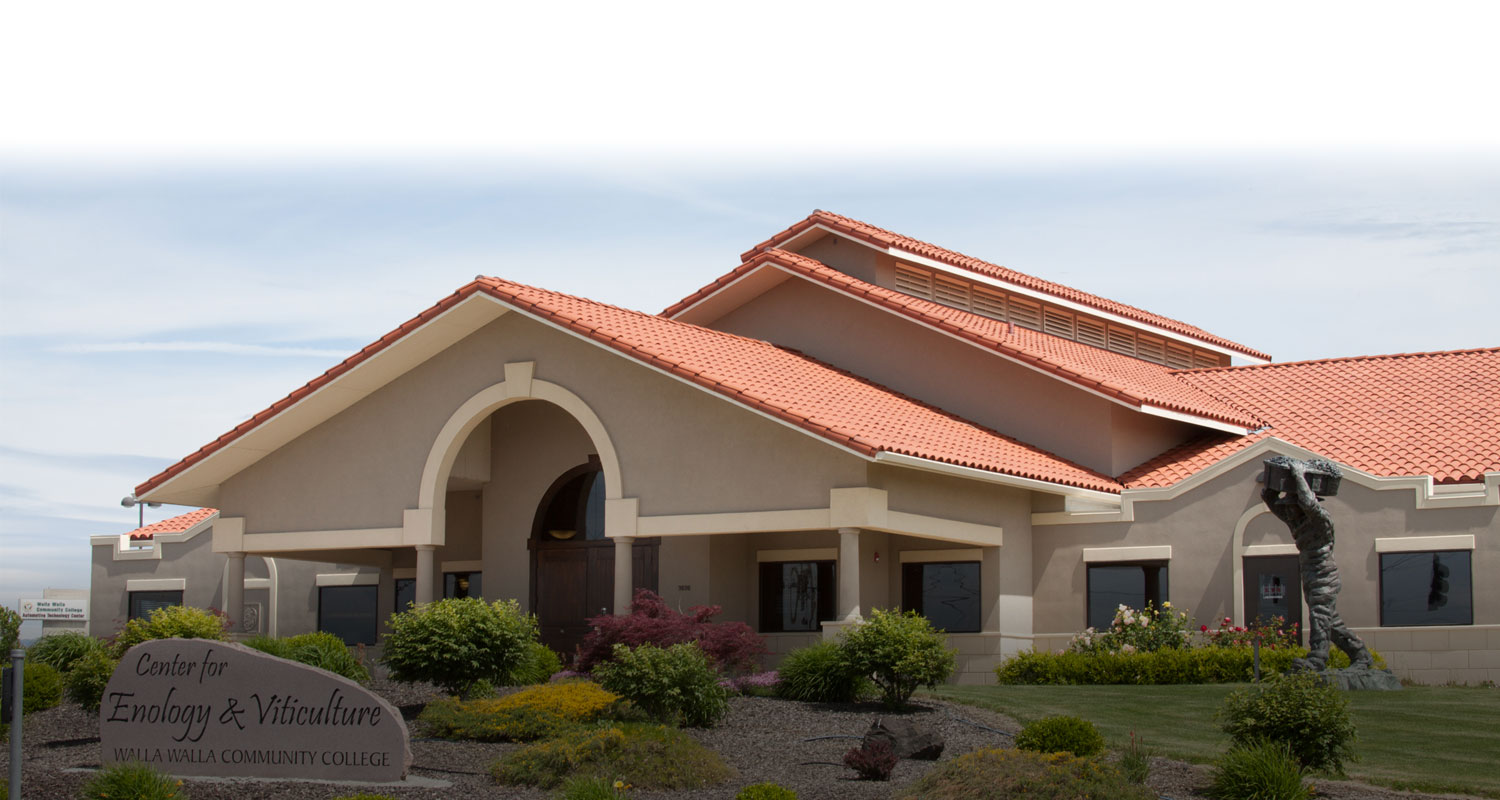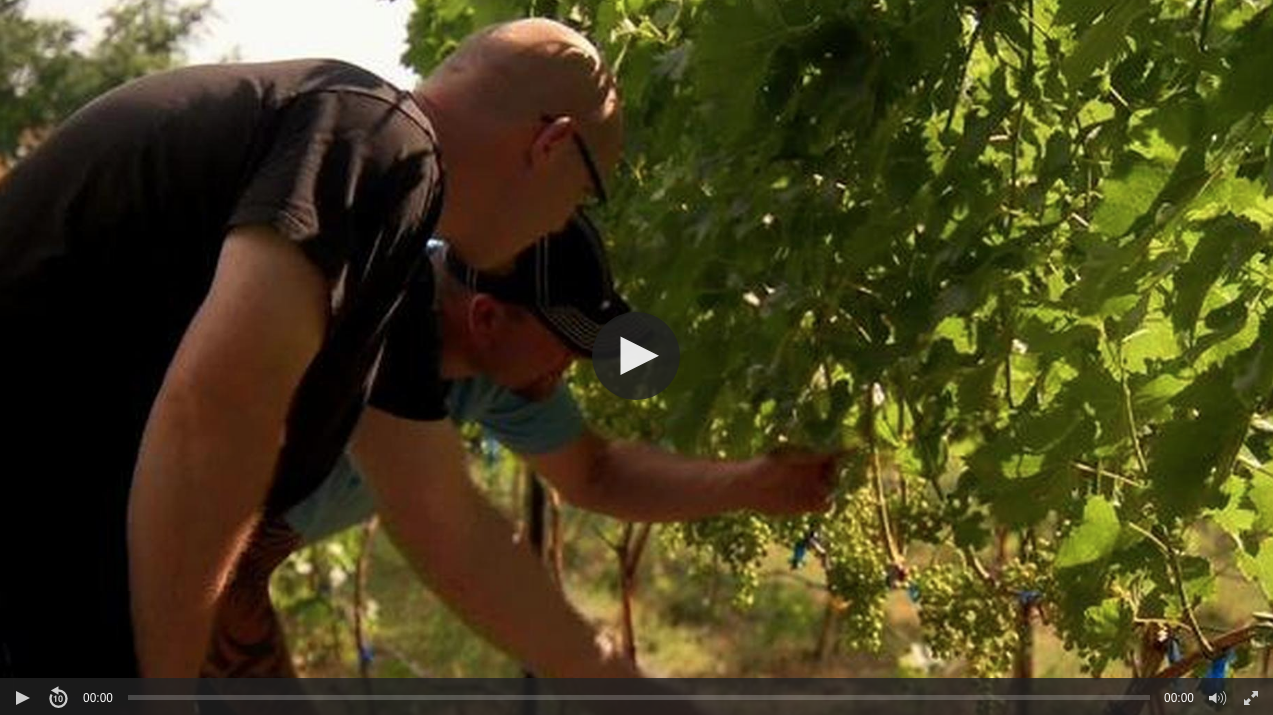College Cellars: Fueling Washington’s Wine Economy
“Depending on the year, about half of all of the fruit harvested in Washington is influenced in some way by a Walla Walla Community College graduate.” — Tim Donahue, Director of Winemaking.
By Abra Bennett
EDITOR’S NOTE: Abra Bennett is the Writer in Residence at Walla Walla Community College and is a 2017 graduate of the Enology and Viticulture Program.
The first community college in the nation to include a working commercial and teaching winery. The first wine degree program in Washington state. Over 1,000 medals for its wine. Hundreds of graduates working in the wine industry. That’s College Cellars, a flagship program of the Walla Walla Community College (WWCC).
“Depending on the year, about half of all of the fruit harvested in Washington is influenced in some way by a WWCC graduate,” says Tim Donahue, Director of Winemaking at College Cellars. “Three of the five largest wine grape processors have WWCC graduates in leadership positions: J&S Crushing (Victor Palencia), Four Feathers (Tyler Harlington), and Goose Ridge (Andrew Wilson).
“Combine that with the hundreds of grads working at smaller wineries and it’s easy to see that WWCC has a substantial impact on not only Walla Walla, but on Washington wine as a whole,” adds Donahue. You’ll find a complete list of College Cellars graduates on the college’s website at: www.collegecellars.com/graduates. It’s a remarkable list.
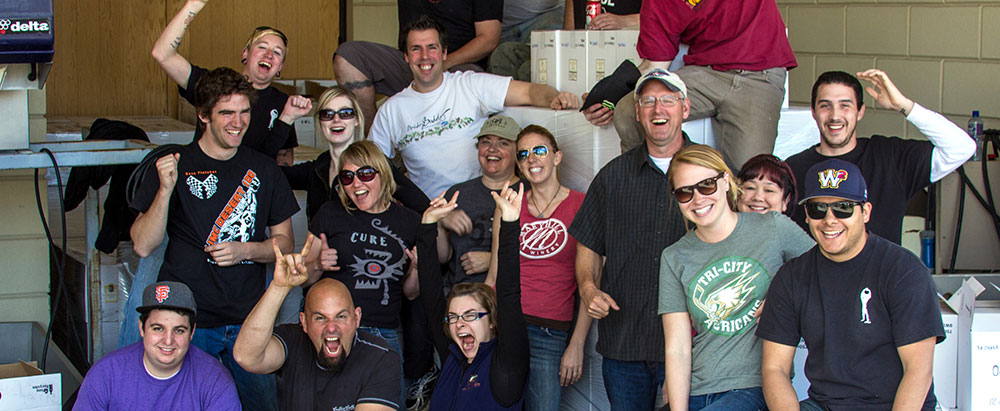
Director of Winemaking Tim Donahue (second from left in the first row of this photo) joins with students in celebrating the completion of the bottling process for a College Cellars 2015 vintage. Photo courtesy of Walla Walla Community College.
This year (2018) is the 15th anniversary of College Cellars. But back in 1999, the whole notion was but a gleam in the eyes of then-WWCC President Dr. Steve VanAusdle, and Dr. Myles Anderson, who was on the verge of retirement from WWCC, and was the co-owner of Walla Walla Vintners.
VanAusdle asked Anderson to look into creating an enology and viticulture program at the college. At that time there were just 19 wineries in Walla Walla, and Anderson began interviewing their owners, asking them whether they saw a need for a program, and if so, what kind of curriculum it should have.
The winemakers told Anderson what they wanted: a job-ready program, with a winery where students would make wine, market it, and sell it. They wanted the program to have a vineyard so students would learn how to plant and maintain the vines, a program where students would learn that viticulture is the most important thing about winemaking. They also wanted a laboratory on site.
Putting such a program in place required a major collaborative effort. Anderson began looking for the six to eight million dollars it would take to build and equip a teaching facility that would include a working winery. And WWCC had to work out a legal way to use state funds to support a program that would be producing alcohol. State Representative Bill Grant supported the college’s efforts and was able to direct a million dollars in cash to the nascent program.
Money flowed in from concerned industry members and community supporters, and from the non-profit Sherwood Trust. Amazingly, when the building was completed in 2003 it was completely paid for, with about 80% of the money coming from local donors.
In 2003, College Cellars opened as Walla Walla’s 20th bonded winery in a 15,000-square-foot facility. Anderson kept his hand in after the program opened, especially as the tenures of the first several program directors were relatively short-lived. Then, in 2010, Tim Donahue appeared on the scene.
“Tim was ideal – he had all kinds of energy, all kinds of ideas,” Anderson says. “I told him that we wanted to maintain the quality of the Walla Walla Valley fruit, to make wines unlike any others in the state. And that we had Marty Clubb, Rick Small, Gary Figgins here, all of them world-class winemakers, all here in one place. We had to follow their lead, and their lead was: you make the best, only the best.”
Donahue set about putting together the program as it exists today. About 30 students start the program each year and spend one year focusing on viticulture, tending 16 varieties of wine grapes on the college’s 6.5 acres of vineyards, and one year learning the science of winemaking.
Through it all, students are working on the crush pad, in the cellar, in the laboratory, and on the bottling line, making wine for sale – currently 2,500-3,000 cases of 32 different wines, including red, white, rose, fortified, sparkling, and ice wine.
They study soil science, insects and weeds, irrigation and chemistry. They taste over 500 wines each year, learn sensory analysis, study wine flaws, and learn how to keep a winery or vineyard business running. They also spend a quarter doing an internship in a winery, doing all it takes to get the fruit of each harvest into barrels or tanks.
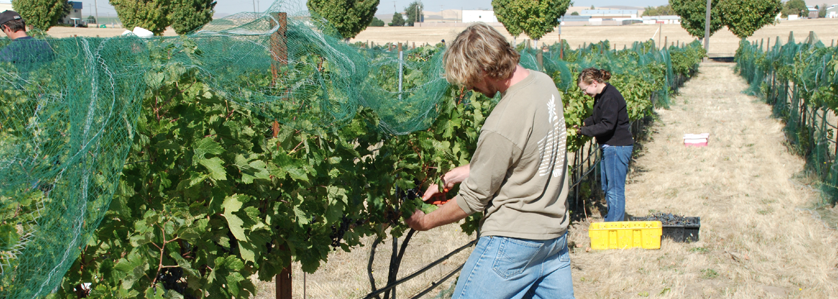
Students at Walla Walla Community College’s Enology and Viticulture Program not only learn how to make wine, but they learn how to grow grapes in the College’s estate vineyard. Photo courtesy of Walla Walla Community College.
The program’s graduates currently number 280. Many students have had job offers before graduation, and all students find that their skills are in high demand. Traditionally, graduates have gone on to become winemakers or vineyard managers, but this year there’s a new addition to the program, one that was requested by industry members.
“The new cellar maintenance program is pretty awesome,” says Donahue. “We are helping to create a workforce for the less glamorous, but equally important jobs in the winery such as bottling line mechanics, cellar masters and general winery managers.”
Another new touch came about with the 2016 hiring of Joel Perez as Director of Viticulture. His focus has been on teaching about organic and biodynamic certifications, vineyard sustainability, Integrated Pest Management, advanced vineyard technology, and sustainable irrigation practices. Currently he is converting one vineyard to completely organic practices, and converting the college’s Cabernet Sauvignon plantings to biodynamic practices.
The program has received widespread acclaim and recognition. Student-made wines have earned over 1,000 medals from such competitions as the San Francisco Chronicle, TexSomm, Indy International, Finger Lakes Wine Competition, Seattle Wine Awards, and local competitions like the Tri- Cities Wine Competition.
College Cellars wines have also received numerous reviews, including 90+ scores from both the Wine Enthusiast and Wine Spectator, along with a host of reviews from Rand Sealy, Great Northwest Wines, Seattle Met, Seattle Times and Sip Northwest.
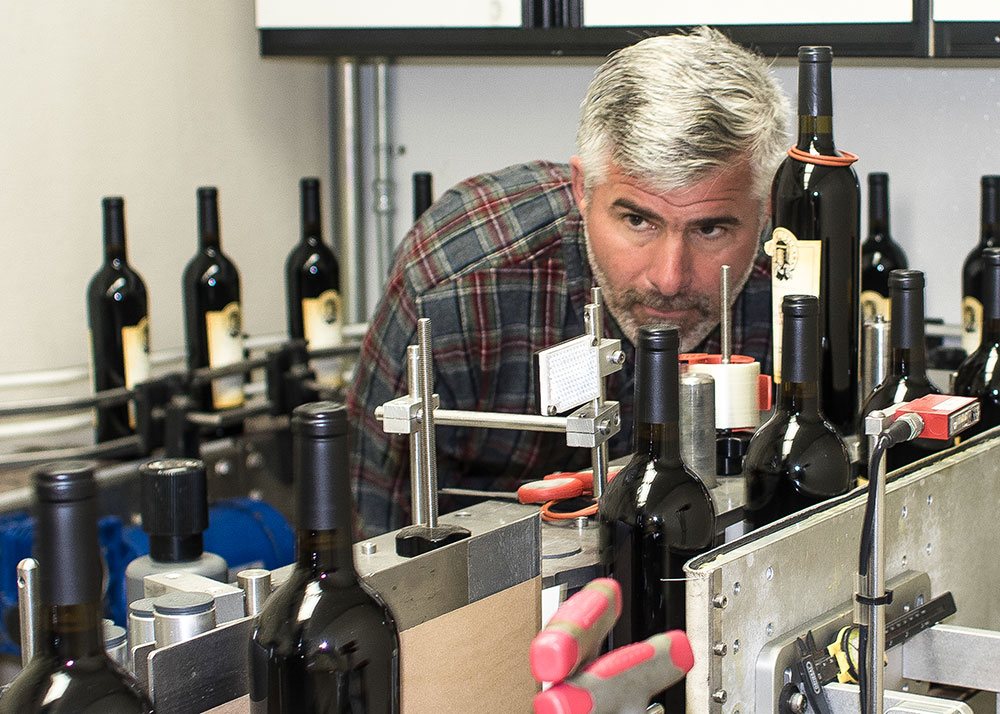
JJ Menozzi, now owner and winemaker at Aluvé Winery in Walla Walla, is a graduate of College Cellars, where he learned every aspect of winemaking, which included working on the bottling line. Photo courtesy of Walla Walla Community College.
In a way, College Cellars owes it all to Myles Anderson’s wife Myrna. Back in 1967 she decided that he needed a hobby, and gave him a gift, Alexis Lichine’s “Encyclopedia of Wine and Spirits.”
“I read that from cover to cover,” Anderson remembers, “and I started to collect the wines that Lichine mentioned. And that’s how I taught myself about wine.”
The knowledge Anderson gained from that book, and the passion it sparked, led to the founding of College Cellars. And although College Cellars doesn’t have an official motto, it could very well be “Knowledge and Passion.” For those are key ingredients that all of the faculty, students, and graduates share, and it’s a blend that you can taste in every wine the students make.
College Cellars Tasting Room
Like commercial wineries, College Cellars has a tasting room. It is located inside the Center for Enology & Viticulture at 3020 E. Isaacs Ave. The tasting room is staffed by Enology & Viticulture students, which serves a dual purpose: students gain valuable experience on the hospitality/customer service side of the wine business, and visitors to the tasting room have a unique opportunity to talk with the student winemakers. The proceeds from the sale of the wines support the Enology & Viticulture program and its students.
The tasting room is open Thursday through Sunday from 11 a.m. to 5 p.m., and there is a tasting fee of $5. Wine may be purchased by the bottle or case whenever the Center for Enology & Viticulture is open: Monday through Friday from 8 a.m. to 5 p.m. and on Saturday and Sunday from 11 a.m. – 5 p.m. The phone number for the Center for Enology and Viticulture is (509) 524-5170.
College Cellars wines are also available for purchase online at www.collegecellars.com. Wine can be shipped to Washington, Oregon, Idaho, California, Colorado, Alaska, Minnesota, Florida, and Washington, D.C.
Variety of Grapes Grown in College Cellars Vineyards
The 16 varieties of grapes grown in College Cellars estate vineyards are: Aligoté, Barbera, Cabernet Sauvignon, Cabernet Franc, Carmenére, Chardonnay, Malbec, Marsanne, Merlot, Petit Verdot, Pinot Meunier, Pinot Noir, Roussanne, Sauvignon Blanc, Semillon and Tempranillo.
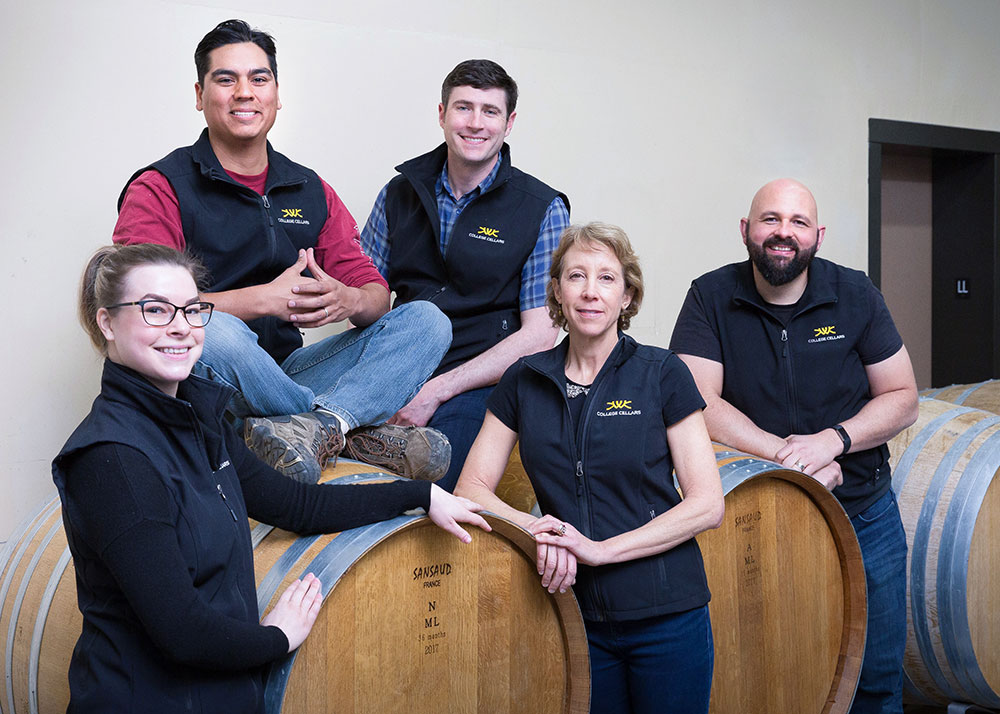
The group of instructors who make things happen at College Cellars are (from left to right) — Sabrina Lueck, Joel Perez, Marcus Rafanelli, Danielle Swan-Froese and Tim Donahue (Director of Winemaking). Photo courtesy of Walla Walla Community College.
Staff Biographies
Tim Donohue – Director of Winemaking. Began teaching at College Cellars in 2010 as an Instructor of Enology and has been the Director of Winemaking since 2014. Holds a B.S. degree in Business Administration from the University of Northern Colorado, and an M.S. in Oenology from the University of Adelaide in Australia. Has worked as the winemaker and general manager at Creekside Cellars in Evergreen, Colorado, and as a cellar hand, wine clerk, and assistant vineyard manager.
Joel Perez – Director of Viticulture. Joined the team in 2016 as the Director of Viticulture. Holds a B.A. degree in Comparative Literature from San Diego State, as well as both a B.S. degree in Integrated Plant Science and an M.S.in Horticulture from Washington State University. Studied at Ecole d’Ingénieurs de Purpan in Toulouse, France in the summer of 2012. At the WSU Irrigated Agriculture Research & Extension Center, worked on grapevine virus identification and vineyard irrigation management. Has lived and worked at Chateau de Roquetaillade in Mazères (Bordeaux) France, and worked local harvests.
Sabrina Lueck – Instructor of Enology. Began teaching at College Cellars in 2011 as an Instructional Tech and has been an Instructor of Enology since 2015. Holds a B.S. degree in Viticulture and Enology from Cornell University and is currently a student of the Institute of Masters of Wine. Previously worked in small vineyards on Vancouver Island and at Chateau Ste. Michelle.
Marcus Rafanelli — Joined the team in 2016 as an Instructor of Applied Winemaking and Viticulture and is the Cellar master for College Cellars. Graduated from Boise State University in 2006 with a B.S.degree in Biology, then graduated from WWCC’s EV program in 2008 with AAAS in Viticulture and Enology. Has worked grape harvests in Australia and Germany, and was the assistant winemaker at William Church Winery from 2008-2010, then became the winemaker there through 2013.
Danielle Swan-Froese — Has worked in the program since 2013 and is the Program Coordinator. Holds a B.S. degree in Exercise Science from Oregon State University.

